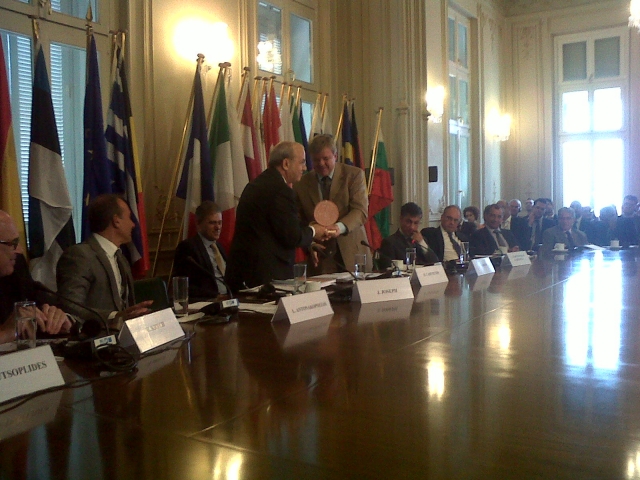Photo: commons.wikimedia.org
Anastasia Balezdrova
Under the shadow of signing a bailout agreement, Cyprus has assumed the rotating presidency of the European Union. "We are excited and fully prepared to take on the difficult task and the challenge," said the Cypriot Ambassador to Athens Joseph Joseph. Minutes earlier, he had received from his colleague, the Ambassador of Denmark, who had chaired the European Union in the last six months, the Phaistos disc wishing Cyprus to be able to solve the difficult tasks.

"I would like to acknowledge the words of my colleague Tom Noring that the small countries holding the presidency are actually more successful in the mission because they are under pressure to do many things," he said.
Then, he summarized the priorities of the Cypriot presidency. "Our motto is "For a better Europe," meaning solidarity, social cohesion, effectiveness and development," said the Ambassador.
He pointed out that Cyprus hopes to end the presidency with the approved 2014 – 2020 budget of the European Union, which amounts to one trillion euro. "Our goal is to make a fair budget to boost growth and to create new jobs, which is the most important issue for young people today."
The Cypriot presidency is expected to focus on energy policy, "about which we have learnt many things after finding the hydrocarbon deposits in the exclusive economic zone of our country." The Ambassador drew particular attention to the fact that Cyprus intends to give weight to the overall maritime policy by signing the so-called Declaration of Limassol.
"The country taking over the presidency cannot impose things, but it can make suggestions," said Joseph Joseph, adding that among Nicosia’s intentions are changes in the common European policy on granting political asylum and the Schengen Agreement.
"Cyprus supports the enlargement of the European Union," the Ambassador said and welcomed the accession of Croatia, which will take place after a year and the beginning of negotiations with Serbia and Montenegro. "The process of accession is nothing more than the continuation of the European Union." Commenting on Turkey's decision to suspend the dialogue with the European Union during the Cypriot presidency, he said that Nicosia supports Turkey's accession, provided that it meets the conditions that apply to all other candidate countries for membership. "We will do what all the other countries do when taking the presidency. We will work in a responsible manner. "
According to Joseph Joseph, the Cypriot presidency will rely on negotiation in dealing with any issues that might arise. One such issue is the possible problem that Greece is expected to face the moment the European Union implements the embargo on oil exports from Iran, which it declared several months ago, because the country depends very much on the supplies from Tehran.
The representative of the European Commission in Athens Pavlos Karvounis explained that the European Union avails a solidarity mechanism in order to provide support for any of the member states experiencing difficulties with fuel supplies.
The Ambassador said nothing specific about the amount that Cyprus is expected to receive from the European Financial Stability Facility.
"The conditions for inclusion in the Facility will be determined after negotiations. We will try to achieve the best possible conditions and then, we will use the funds we receive in the most rational way."
Joseph Joseph was reluctant to predict whether the bailout to Cyprus will be similar to that to Greece or Spain, but said that his country has found itself in a difficult situation, mainly because the Cypriot banks have been exposed too much to the Greek crisis.
The Ambassador presented the logo of the Cypriot presidency, which involves the colours of Cyprus and the European Union as well as a short video portrait of the country.
